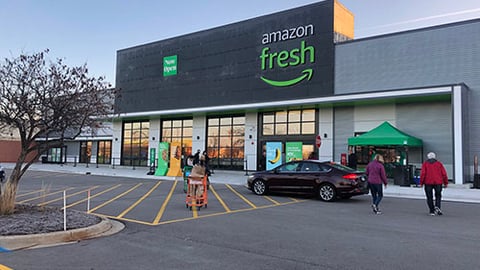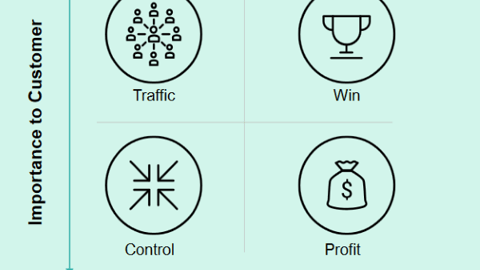Walmart, Aldi, Kroger and Amazon Are Tops for Value
According to findings of a year-long 22-country study of the effect of COVID-19 on consumers, customer data science company dunnhumby, the global leader in customer data science, found increasingly value-minded shoppers are turning to particular retailers. Thirty-three percent of respondents to the seventh Wave of the dunnhumby Pulse Survey mentioned Walmart first when asked which stores provide the best value, followed by The Kroger Co. and Aldi, both tied at 10%, and then by Amazon, at 6%.
The survey found that Americans, for the first time since the pandemic began, are starting to feel better about their personal finances and are now placing value higher than speed when they shop.
Fifty-eight percent of U.S. consumers surveyed by dunnhumby characterized the U.S. economy as weak, a dramatic 17% drop from last March, when 75% thought so. The study additionally found that 39% of consumers described their finances as poor, a 15% decline from last November, when 54% said that their finances were in bad shape. Americans are currently at their lowest level of worry about the virus — just 23% — since the onset of the pandemic, having fallen nine percentage points since November on the dunnhumby Worry Index.
Although U.S. consumers’ confidence is beginning to return, they’re still concerned about food costs, with 43% saying that they’re paying more than they did pre-pandemic, while only 24% said that they were paying less. Subsequently, 80% are taking at least one action in search of value, with the most popular action, chosen by 52%, being to shop at stores with everyday low prices. Consumers’ renewed focus on value seeking aligns with the dunnhumby 2021 Grocery Retailer Preference Index, which predicted that the importance of value would return once consumers’ worry about the virus abated.
“While this Wave marks the first time since the pandemic struck that consumers are feeling better financially, we also see value seeking driving shopping behavior,” observed Grant Steadman, president for North America at Chicago-based dunnhumby. “It’s noteworthy that consumers are now prioritizing value instead of speed, which was their key driver for much of 2020.”
Key findings from the study include:
- Value-seeking consumers (70%) far outpace quality-seeking consumers (13%) in the United States.
- Consumers are employing various shopping tactics to seek value in the face of rising prices. After shopping at everyday low price stores (52%), the most popular consumer shopping tactics are buying some brands on sale (36%), stocking up on products that are on sale or promotion (36%), searching online to find the best sales (34%), searching online for coupons (34%), and buying private brands when available (33%).
- Online shopping has grown stronger in every Wave. Shopping in stores has declined from 77% of all trips in March 2020 to 64% in February 2021, while shopping online (including pickup and delivery) has grown from 23% in March 2020 to 36% in February 2021. The number of online trips is also rising. In March 2020, consumers said that online shopping trips accounted for 1.3 of their trips each week, but by the end of February 2021, online trips had increased to account for 3.6 of their trips each week.
- Consumer satisfaction with shopping online has been ahead of, or equal to shopping in store since September 2020, with survey respondents also noting a 53% net satisfaction for pickup, and 49% for delivery.
- Pandemic-driven changes in shopping behavior are stabilizing. From the start of the pandemic, consumers shopped at stores when fewer people would be there (63%), made fewer trips to the store (74%) and spent more on each trip (38%). By the end of February 2021, 49% of consumers shopped at fewer stores, a 14% decrease; 53% made fewer trips to the store, a 21% decline; and just 21% spent more on each trip, a 17% drop. In fact, respondents said that they made 6.4 trips (including online) to the store weekly in February 2021, versus 3.8 in March 2020. Also in February, grocery led all retailers with the most weekly shopping trips (68%), followed by convenience stores (29%), hypermarkets/clubs (20%), discounters (20%), and pharmacies (15%).
For the study, dunnhumby surveyed 48,449 respondents online in 22 countries: Asia (Australia, China, South Korea, Malaysia, Thailand), Europe (Czechia, Denmark, France, Germany, Hungary, Italy, Norway, Poland, Slovakia, Spain, United Kingdom), Latin America (Brazil, Chile, Colombia), and North America (United States, Mexico). The online interviews were conducted for Wave 7 Feb. 18-24. About 400 individuals were interviewed in each country for each Wave of the study, and respondents were roughly 60% female and 40% male.
Bentonville, Arkansas-based Walmart operates more than 11,300 stores under 56 banners in 27 countries, and e-commerce websites, employing 2.2 million-plus associates worldwide. Walmart U.S. is No. 1 on The PG 100, Progressive Grocer's list of the top food and consumables retailers in North America, while Walmart-owned Sam's Club ranks No. 9 on the list. Seattle-based Amazon is No. 2 and Cincinnati-based Kroger is No. 3 in PG's ranking, while Batavia, Illinois-based Aldi U.S. is No. 26.






